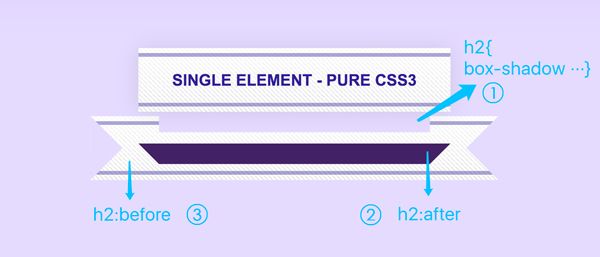标贴-1的结构是:中间字体背景这一块,加上下面两块。通过绝对定位,把下面两块分别定位到中间那块的两头。
两个脚是用
border做的,和做三角形的手法是一样的,只不过是去掉了一个边,留下了三个边。
结构
样式
#header {
height: 56px;
display: inline-block;
position: relative;
margin-left: 56px;
}
#header a {
color: #fff;
text-decoration: none;
font-size: 24px;
line-height: 56px;
padding: 10px 20px;
background-color: #16A085; /*--背景色--*/
border: 3px solid #eee; /*--边框色--*/
}
/*--伪元素制作边框--*/
#header:before, #header:after {
content: '';
height: 0;
width: 0;
position: absolute;
left: -45px;
top:30px;
z-index: -1;
}
#header:before {
border-top:28px solid #018B72;
border-right:28px solid #018B72;
border-bottom:28px solid #018B72;
border-left:28px solid transparent; /*--左边边框消失--*/
}
#header:after {
border-top:28px solid #018B72;
border-right:28px solid transparent; /*--右边边框消失--*/
border-bottom:28px solid #018B72;
border-left:28px solid #018B72;
right: -45px; /*--移动到右边--*/
left: auto;
}
标贴-2的做法又不一样了,共三个图层。
结构
Single Element - Pure CSS3
样式
*{
margin: 0;
padding: 0;
}
body {
background-color: #E5DCFF;
text-align: center;
box-shadow: inset 0 0 100px 50px #D0BDFD; /*--紫色的内阴影--*/
}
h2 {
display: inline-block;
font-size: 14px;
line-height: 28px;
font-family: arial, verdana;
outline: none;
margin: 120px 0;
padding: 14px 30px;
color: #302694;
text-transform: uppercase; /*--全部大写--*/
box-shadow:
0 0 30px 0 rgba(0, 0, 0, .1),
0 36px 0 -18px #E5DBFF; /*--h2下面的投影--*/
position: relative;
}
h2设置了行高和内边距,还没有填充背景色。
h2:before{
content: '';
position: absolute;
top: 18px;
left: -15%;
width: 130%;
height: 0;
border: 28px solid rgba(0, 0, 0, 0);
border-left: 28px solid #E5DCFF;
border-right: 28px solid #E5DCFF;
z-index: -1;
}
宽度比标题那栏宽30%,所以要往左边挪15%,使两边对称。再往下挪了18个像素。左右边框填充背景色,看起来就像剪掉了一样。
h2:after {
content: '';
position: absolute;
top: 100%;
left: 0;
width: 100%;
height: 0;
border-top: 18px solid #432464; /*--只留下上边框,显示为梯形--*/
border-left: 18px solid transparent;
border-right: 18px solid transparent;
z-index: -1;
}
宽度因为和h2是一样的,所以设置了100%,它的位置正好在h2的下面,于是绝对定位设置top:100%,这一层深色的框被上面的h2box-shadow遮住了中间的部分,只剩下左右两个角,正好是想要的效果。
h2, h2:before {
background-image:
/*上下两条深色的线条*/
linear-gradient(
transparent 8%,
rgba(48, 38, 148, 0.4) 8%,
rgba(48, 38, 148, 0.4) 14%,
transparent 14%,
transparent 86%,
rgba(48, 38, 148, 0.4) 86%,
rgba(48, 38, 148, 0.4) 92%,
transparent 92%),
/*白色带透明度的背景渐变*/
linear-gradient(
rgba(255, 255, 255, 0.75),
rgba(255, 255, 255, 0)
),
/*细线条纹理*/
linear-gradient(
45deg,
transparent 40%,
rgba(0, 0, 0, 0.1) 40%,
rgba(0, 0, 0, 0.1) 60%,
transparent 60%),
/*白色背景*/
linear-gradient(white, white);
/*背景尺寸*/
background-size:
cover, /*宽线条*/
cover, /*白色渐变*/
4px 4px, /*细线条*/
cover; /*白色背景*/
}
h2, h2:before, h2:after {
box-sizing: border-box;
background-origin: border-box;
} /*Fix to make the borders appear on the ribbon ends also*/
背景的纹理都是 “渐变属性” 完成的。
最后为什么设置box-sizing: border-box呢?去掉这一条,你会发现:
box-sizing:border-bo是CSS3新增属性,了解这个属性,我们先从块级元素的盒子大小说起,通常一个块级元素实际所占宽高度=外边距(margin)+ 边界宽度(border-width) + 内边距(padding)+ 高度(height) / 宽度(width)
如果设置了border-box,实际所占宽高度 = 设置的高度(height)/ 设置的宽度(width)+ 外边距(margin)。
所以设置了box-sizing:border-bo的h2:before, h2:after会回到之前给它们分别设置的宽度:130%,100%。



